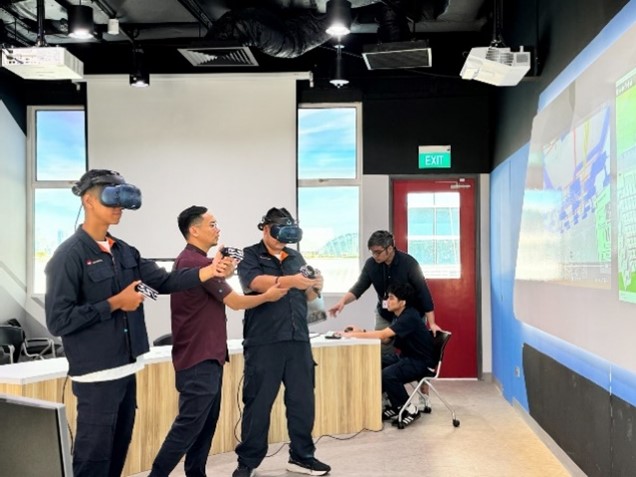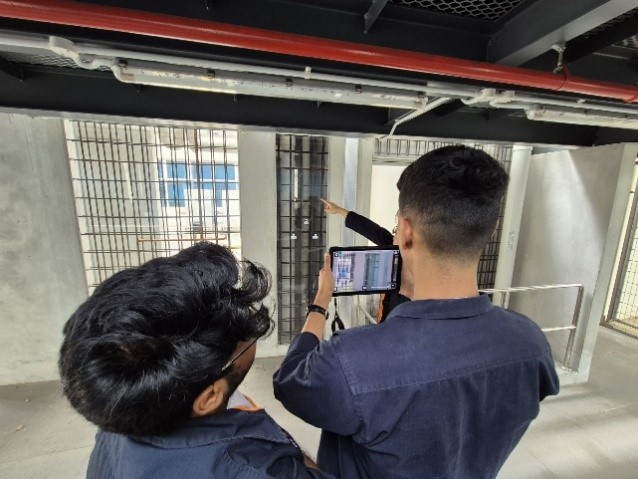Sustainable Built Environment Hub will be used to train ITE students in skills and technologies that support the digital transformation of the built environment sector
The Institute of Technical Education (ITE) has launched a new purpose-built training facility to equip students with relevant digital and technical skills for the Architecture, Engineering, and Construction (AEC) sector.
The Sustainable Built Environment Hub at ITE College East provides students with training to support the industry’s adoption of Integrated Digital Delivery — which focuses on using digital tools to streamline work processes across the entire building lifecycle, including design, construction, operations, and maintenance. Developed with industry support, the Hub will offer training in areas such as:
- Virtual Design and Construction, an advanced approach using 3D digital models to plan and manage projects virtually before building begins
- Design for Manufacturing and Assembly (DfMA), which focuses on optimising the design of building parts for ease of manufacturing and efficient assembly
- Smart facilities management
- Workplace safety and health
It is the first facility of its kind at an educational institution in Singapore to offer one-stop integrated learning across the entire building lifecycle.
Mr Kelvin Wong, Chief Executive Officer of the Building and Construction Authority (BCA), officiated the launch of the facility at ITE’s Sustainable Built Environment Seminar today.
Training Future Built Environment Professionals
Spanning over 2,000 square metres, the Sustainable Built Environment Hub houses specialised training centres that simulate real-world work environments and technologies used across the built environment sector. These include the:
- Collaborative Design Centre – which provides training in 3D digital building design and modelling
- Built Environment Technology Centre – which features zones for DfMA, smart facilities management and project coordination, incorporating augmented and virtual reality technologies into digital construction workflows
- Smart Vertical Transportation Centre – which provides training in lift and escalator systems, supported by modern IoT and remote monitoring systems
- Workplace Safety & Health Centre – which offers immersive safety simulations for workplace safety training
| |
|---|
 [An indoor collaborative space within theHub where students can access cloud-based BIM models and use virtual reality tools for project refinement] |  [An outdoor training area within the Hub that uses augmented reality to enable virtual visualisation of service coordination prior to physical assembly] |
More than 1,500 students from ITE’s built environment courses will train at the Hub annually as part of their curriculum and project work. These courses include the Work-Study Diploma in Mechanical & Electrical Services Supervision, Work-Study Diploma in Vertical Transportation, Work-Study Diploma in Architectural BIM & Design, Technical Engineer Diploma in Civil & Structural Engineering, and Higher Nitec in Facilities Management & Engineering.
Ms Low Khah Gek, Chief Executive Officer of ITE, said, “Through this facility, we aim to nurture a future-ready workforce for the built environment sector — one that is digitally and technically competent to drive innovation and sustainability in the built environment. By integrating the latest industry technologies into our training, we are preparing our students to meet the evolving demands of this fast-changing sector and contribute meaningfully to a greener, smarter built environment.”
Deepening Industry Collaboration
At the Sustainable Built Environment Seminar, ITE also signed Memoranda of Understanding (MOUs) with four organisations – BCA, Singapore Institute of Building Limited (SIBL), Singapore International Facility Management Association (SIFMA), and Trimble Solutions SEA Pte Ltd.
These partnerships aim to strengthen skills and professional development in the built environment sector, while providing ITE students with valuable industry exposure. Key areas of collaboration include the development of training and certification programmes for the lift and escalator sector aligned with the Progressive Wage Model, internships for students, training programmes for adult learners, and access to advanced BIM solutions.